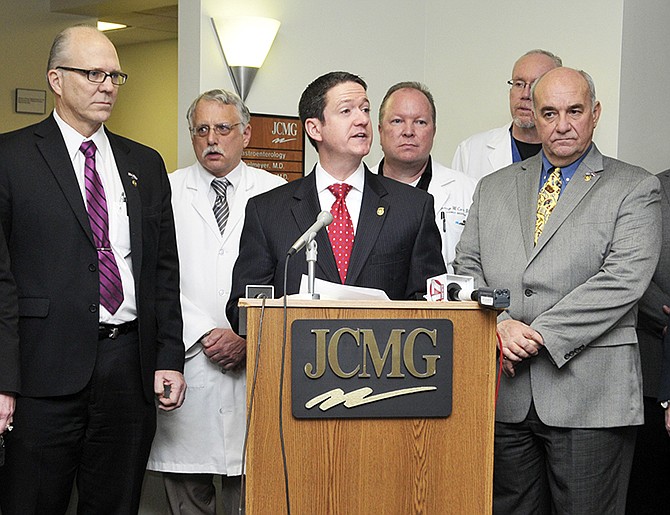Jefferson City Medical Group (JCMG) announced Thursday it is in favor of capping medical malpractice payments to patients - one of Missouri House Speaker Tim Jones' priorities for the legislative session.
"As soon as liability goes up, it diverts dollars away from health care and puts it to insurance companies and attorneys," said Dr. Richard Jennett, president and CEO of JCMG.
Jennett knows from experience that medical practices are put in jeopardy when insurance prices increase.
He said that in the early 2000s, the crisis wasn't in malpractice, but in litigation.
"We were having all sorts of abusive lawsuits," he said. "Our malpractice premiums were rising at a rate that was unsustainable and in 2004 or 2005 we actually got to the point where we might actually have to close the doors of Jefferson City Medical Group, because we couldn't get insurance."
In 2005, then-Missouri Gov. Matt Blunt signed malpractice reform into law.
The law required lawsuits to be filed where the alleged injury or wrongdoing took place, it capped punitive damages at $500,000 or five times the actual damages, and it lowered the cap on non-economic damages to $350,000.
A 2012 Missouri Supreme Court case, Watts v. Lester E. Cox Medical Centers, struck down the $350,000 cap on non-economic damages in malpractice lawsuits and ruled patients have a right to trial by jury.
Jennett said insurance rates are issued on a two-year basis. Because of the Supreme Court ruling, he expects JCMG's next insurance rate quote to be much higher.
He said in the past, JCMG's rate has been hundreds of thousands of dollars and at one point was more than $1 million.
"They calculate how much they have to charge us based on how much they have to pay out in settlements," Jennett said. "As soon as the settlements start going up again and there's no limit to it, the insurance companies will put our rates right back to where they were before.
"We will not be able to bring in doctors, we will not be able to build buildings and we won't be able to provide the type of health care that people want."
Jones said Missouri's non-action on malpractice reform could put the state behind competitively with other states, "states that we compete with for jobs every day, including in the health care industry," Jones said. "We look at states like Tennessee who passed malpractice reform in 2008. They have drastically reduced the number of lawsuits, falling more than 36 percent in the last five years."
A report card released Thursday by the American College of Emergency Physicians gave Missouri an "F" and ranked the state 45th out of all states and Washington, D.C., in terms of its medical liability environment.
Jennett said the ranking isn't surprising, and JCMG will remain committed to malpractice reform.
"We take a position on vital issues, and this is critical," he said. "It deals with our ability to continue to provide high quality health care."

